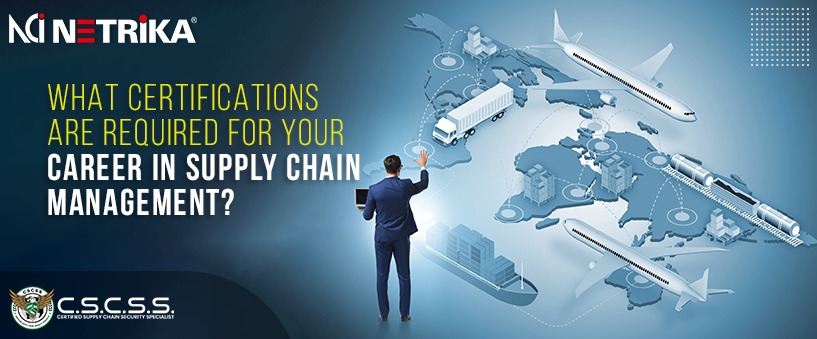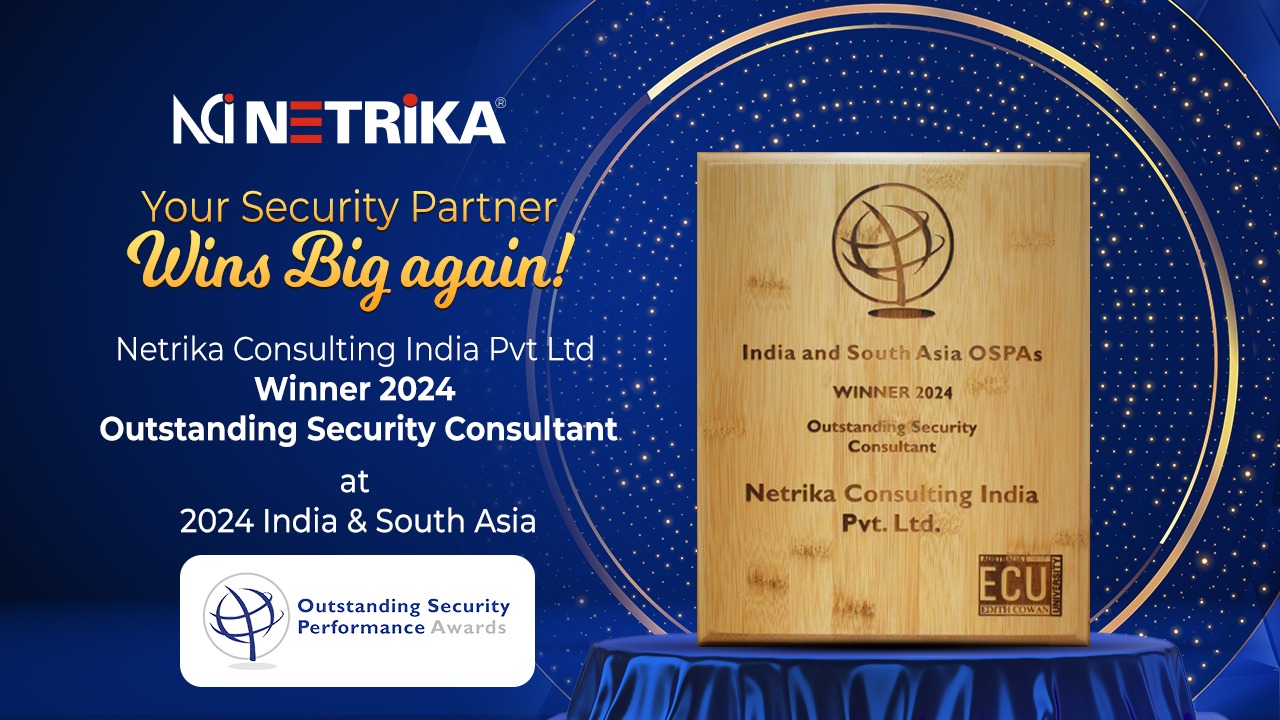News & Events
What Certifications Are Required For Your Career In Supply Chain Management
- November 3, 2023
- Posted by: marketing@netrika.com
- Category: Blogs

Supply Chain Security Certification
The supply chain industry is booming, and owing to global trade, it is impossible to envisage a flow of goods, products, or services without sourcing, procurement, purchasing, operations, logistics, and delivery. At any given time, there are lots of positions in the supply chain industry available in most nations throughout the world, ranging from an entry-level purchasing executive to a high-level strategic sourcing consultant. Not to mention the other aspects of supply chain management, such as logistics, warehousing, inventory management, order management, and spend management.
The supply chain management certification (CSCSS) is a valuable credential for professionals in the supply chain industry who are responsible for managing and mitigating risks related to security threats. This certification demonstrates an individual’s knowledge, skills and expertise in supply chain security.
Importance of CSCSS Certification
The global supply chain is becoming increasingly complex, with multiple stakeholders and supply chain partners involved in moving goods from one place to another. As the supply chain becomes more interconnected, it also becomes more vulnerable to security threats such as theft, terrorism, and cyber-attacks. To mitigate these risks, it is critical that supply chain professionals have a comprehensive understanding of supply chain security and the best practices for managing it.
The CSCSS certification (Certified Supply Chain Security Specialist) provides professionals with the knowledge and skills needed to effectively manage and mitigate supply chain security risks. These certifications for supply chain professionals cover a wide range of topics, including risk assessment, security planning, physical security and cybersecurity, to help professionals develop a holistic approach to supply chain security.
Requirements to Obtain CSCSS Certification
To obtain the supply chain security certification, candidates must meet the following requirements:
- Professional experience: Candidates must have at least five years of experience in supply chain security or a related field.
- Education: Candidates must have a bachelor’s degree from an accredited institution or an equivalent combination of education and experience.
- Reference: Candidates must provide two professional references from individuals who can attest to their experience and knowledge in supply chain security.
- Examination: Candidates must pass the supply chain security certification examination, which covers topics such as risk assessment, security planning, physical security, and cybersecurity.
Benefits of Obtaining CSCSS Certification
Obtaining the CSCSS certification can provide a number of benefits for supply chain professionals, including:
- Demonstrating expertise: The certification demonstrates that the individual has the knowledge and skills to effectively manage and mitigate supply chain security risks.
- Meeting job requirements: The supply chain security certification is recognized by many companies and industries and may be required for certain roles, such as supply chain security managers or consultants.
- Competitive advantage: In a competitive job market, having the CSCSS certification can help set an individual apart from other candidates and increase their chances of being hired or promoted.
- Professional development: Pursuing the supply chain security certification can be a valuable way to continue professional development and stay up-to-date on the latest trends and best practices in supply chain security.
Preparing for the CSCSS Examination
Preparing for the supply chain security certification examination requires a comprehensive understanding of supply chain security and the ability to apply that knowledge to real-world scenarios. Netrika offers a range of resources to help candidates prepare for the exam, including study materials, training courses and practice exams to help candidates prepare for the format and types of questions they will encounter on the actual exam.
Obtaining a certification in supply chain management can be a valuable investment in your career. However, it’s important to carefully consider the cost-benefit and ensure that obtaining a certification aligns with your long-term career goals. It’s also important to gain practical experience and continue to develop your skills in the field, as a supply chain security certification alone does not guarantee career success or job security.
FAQ
What is SCM (Supply Chain Management)?
At the most fundamental level, supply chain management (SCM) is management of the flow of goods, data, and finances related to a product or service, from the procurement of raw materials to the delivery of the product at its final destination.
What is supply chain management?
Supply chain management is the handling of the entire production flow of goods or services—starting from the raw components to delivering the final product to consumers.
What is the SCM process?
Supply chain management (SCM) is a sequence of processes in product distribution. It is a way of managing the flow of goods and services to and from your business in the most efficient and cost-effective way possible.
Can I study supply chain management online?
Yes, you can study supply chain management online through various courses and programmes offered by educational institutions and online learning platforms.
What is a secure supply chain certification?
The program aims to provide participants a thorough understanding of end-to-end supply chain security practices for them to incorporate and enhance within their organization's security outfit.
What is a supply chain certification?
Earning your CSCP designation shows that you have the skills to prepare for and overcome disruption, manage risk, and evaluate and implement modern supply chain technologies. CSCP content covers the following key topics: Supply Chains, Demand Management and Forecasting. Global Supply Chain Networks.

